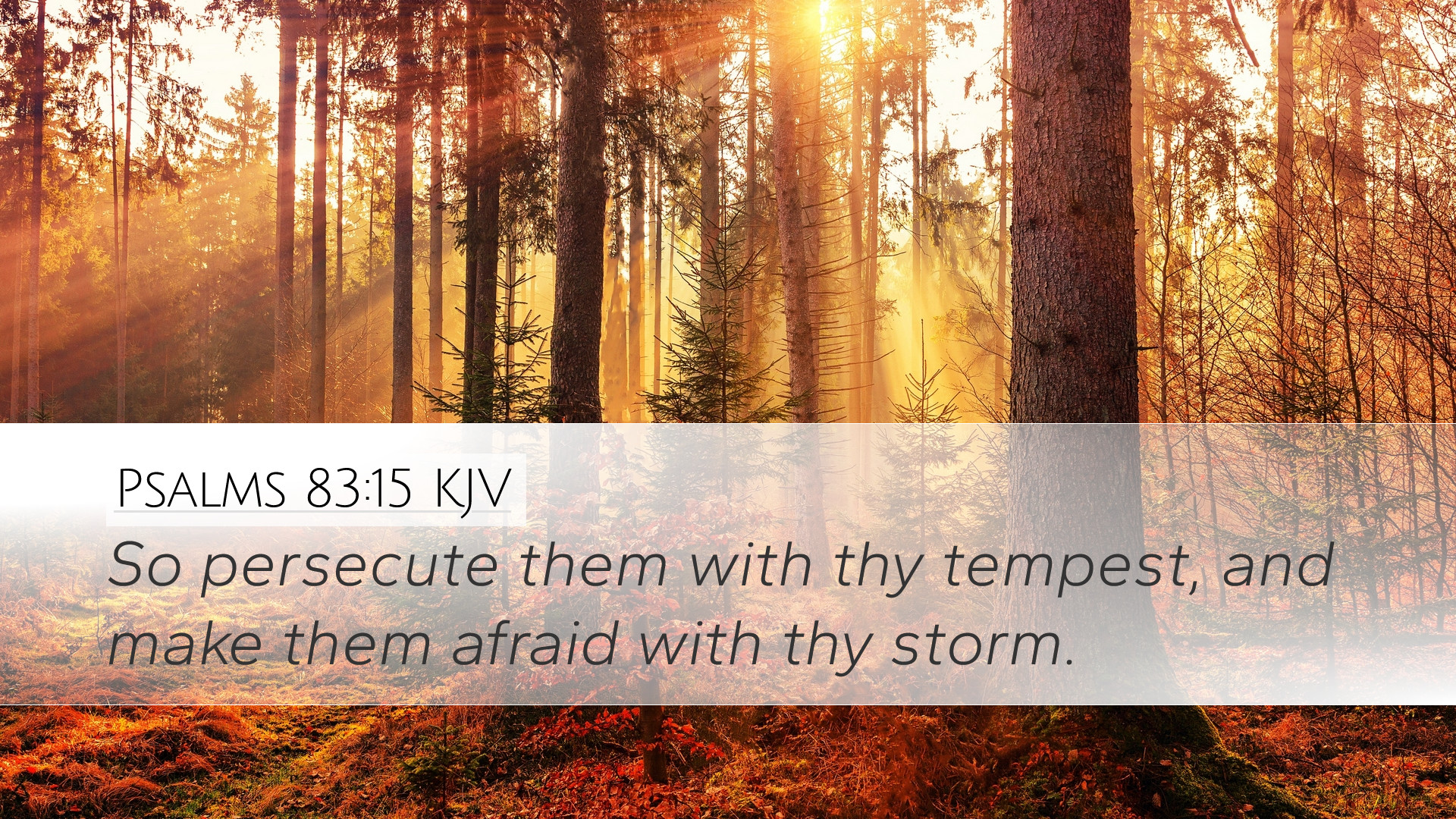Commentary on Psalms 83:15
Bible Verse: "So pursue them with your tempest and terrify them with your storm." - Psalms 83:15
Introduction
The psalmist, in this powerful plea, calls upon God to act decisively against the enemies of Israel. This verse, nestled within a psalm that speaks to the collective strife faced by God's people, encapsulates a fervent desire for divine intervention. Various public domain commentaries provide valuable insights into the meaning, context, and theological implications of this verse.
Contextual Analysis
The broader context of Psalm 83 reveals a situation where the psalmist laments the conspiracies and aggressions that threaten the people of Israel. This particular verse is situated within a prayer that seeks the destruction of those who seek harm to God’s chosen people. Understanding the historical circumstances surrounding this psalm helps illuminate its urgent tone and requests.
Insights from Matthew Henry
According to Matthew Henry, this psalm is categorized as a prayer of complaint and imprecation. Henry emphasizes that the psalmist is invoking the wrath of God upon the enemies, requesting not just any action but a tempest—illustrative of overwhelming power and divine justice. The imagery of a storm represents chaos, conveying the idea that God’s interventions can turn the tide of battle in favor of His people.
Interpretation by Albert Barnes
Albert Barnes elucidates this verse by noting the significance of the tempest as a metaphor for God's might. He interprets the "tempest" and "storm" as symbols of divine retribution. Barnes further suggests that such natural phenomena often accompanied divine judgment in Biblical narratives, serving as a reminder of God's sovereignty over the elements and nations. The pursuit of the enemies with a storm signifies both an imminent threat and the certainty of divine judgment aimed at restoring order and justice.
Adam Clarke's Commentary
Adam Clarke offers a detailed reflection on the psalmist’s request for terror upon the adversaries. He notes that the psalm is not merely about vengeance but reflects a desire for God's glory to be made manifest through His power against those who oppose His people. Clarke emphasizes the theological assertion that God’s power can intervene in the affairs of men, and when invoked, it terrifies the wicked and reassures the faithful.
Theological Reflections
This plea for God to pursue enemies with a tempest encapsulates key theological themes:
- Divine Sovereignty: The assertion that God controls nature illustrates His sovereignty over all creation, emphasizing that no human power can thwart His purposes.
- Justice of God: The desire for God to act against unjust adversaries reflects a deep understanding of justice, indicating that where evil prevails, God's judgment will ultimately bring restitution.
- The Role of Prayer: The act of calling on God highlights the importance of prayer in the life of believers, showcasing that prayer is a means of soliciting divine intervention in dire circumstances.
Practical Application
For pastors, students, and theologians, Psalms 83:15 serves as an important biblical reference for understanding how to approach prayer for justice. The fervor and zeal expressed in the psalm demonstrate a relational dynamic with God, portraying how believers can express urgency and emotional honesty in their prayers.
Additionally, this verse offers a framework for interpreting adversities faced by individuals and communities. Believers are reminded that while adversities may arise, there exists recourse to the Almighty, who is able to enact deliverance, reminding us to rely on God’s strength and timing.
Conclusion
Psalms 83:15 encapsulates a powerful plea for divine intervention characterized by tempestuous imagery. Through the insights from public domain commentaries, we understand the depth of the scripture both historically and theologically, recognizing the intertwining themes of justice, divine sovereignty, and the power of prayer. As we reflect on this verse, it invites believers to trust in God’s relentless justice and his ability to act decisively in the face of challenges.


